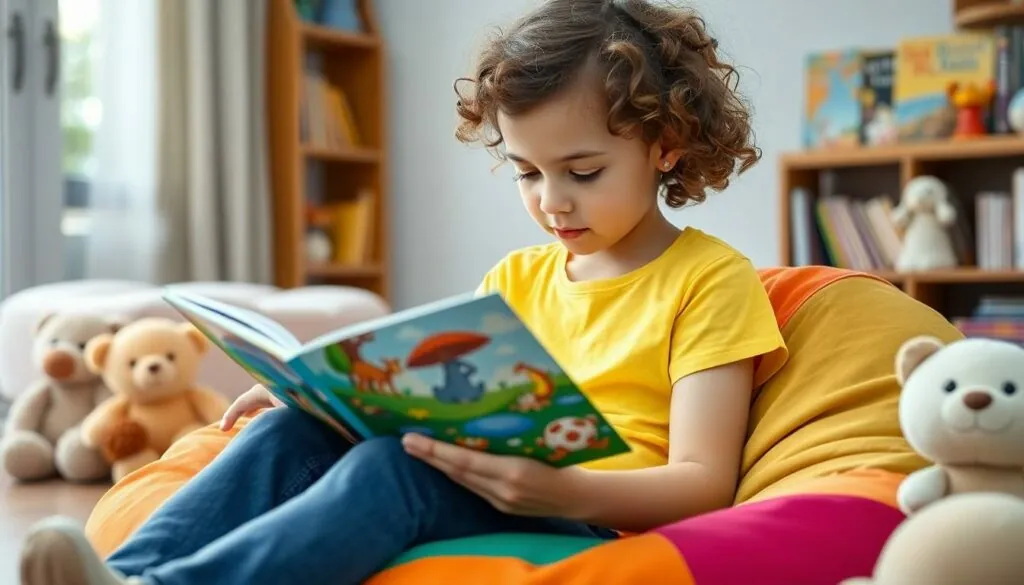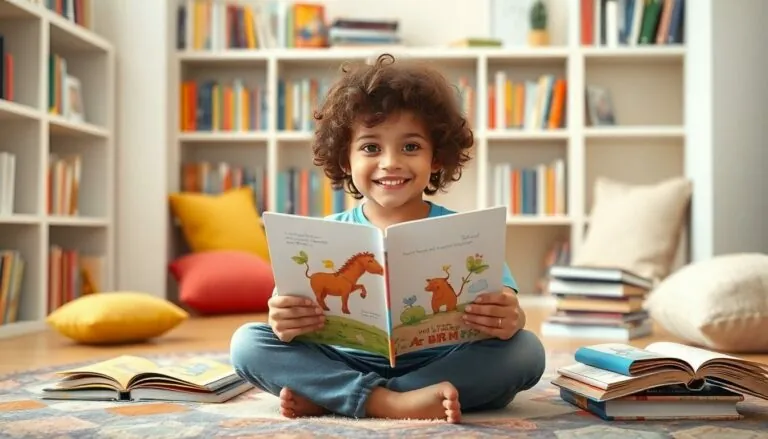Table of Contents
ToggleImagine a world where kids can travel to distant galaxies, solve mysteries, and even befriend dragons—all without leaving their cozy reading nook. Reading isn’t just a pastime; it’s a superpower that unlocks endless adventures and knowledge. When kids dive into books, they’re not just flipping pages; they’re building their imaginations, boosting their brains, and sharpening their skills for life.
From enhancing vocabulary to improving focus, the benefits of reading for kids are like a treasure chest waiting to be opened. It’s not just about keeping them quiet during a long car ride; it’s about setting them up for success. So let’s explore how turning those pages can turn your little ones into confident communicators and creative thinkers, all while having a blast. After all, who wouldn’t want to be a hero in their own story?
Overview of Reading for Kids
Reading acts as a fundamental tool for cognitive development in children. Engaging with books introduces kids to diverse ideas, cultures, and perspectives, broadening their understanding of the world. It’s crucial for vocabulary expansion; encountering new words within context enhances language acquisition.
Children develop focus and attention skills through reading. Regularly exploring stories encourages sustained engagement, which is essential for academic success. Comprehending complex narratives also boosts critical thinking abilities, allowing them to analyze characters and plot development.
Creativity flourishes as kids immerse themselves in different genres. Storytelling ignites imagination; they envision characters and settings, often sparking their own creative endeavors. Reading lays the groundwork for effective communication, teaching them how to articulate thoughts clearly.
Social skills strengthen when children discuss books with peers or family. These conversations foster empathy, as kids learn to relate to various characters’ emotions and challenges. Establishing a routine that includes reading cultivates a lifelong habit, reinforcing the joy of exploration through literature.
The impact of reading on mental health is noteworthy. A quiet reading session provides a comforting escape from daily pressures. It supports emotional regulation, enabling them to understand and express their feelings better.
Integrating reading into children’s daily routines proves vital. The benefits extend beyond academics, shaping well-rounded individuals equipped for life’s challenges.
Cognitive Benefits
Reading offers numerous cognitive benefits that promote children’s intellectual growth and emotional understanding. Engaging with books enhances learning, opening doors to new ideas and experiences.
Language Development
Children expand their vocabulary by encountering words in various contexts. Hearing stories introduces them to diverse language structures. This natural exposure boosts their ability to express themselves effectively. Understanding complex narratives enhances fluency and comprehension. As kids explore different genres, they assimilate new phrases and expressions, enriching their communication skills.
Improved Concentration
Reading fosters improved concentration skills, which are vital for academic achievement. Immersing in a story requires sustained attention, nurturing focus over time. They become accustomed to longer periods of engagement as they journey through plots and characters. This practice translates to better attention spans in other activities, enhancing overall learning. Regular reading habits encourage discipline and commitment, crucial traits for success in school and beyond.
Social and Emotional Benefits
Reading offers substantial social and emotional benefits for kids, nurturing their development in crucial areas.
Empathy and Understanding
Books introduce children to diverse characters and scenarios. Engaging with various narratives fosters empathy as kids relate to others’ emotions and struggles. For instance, understanding a character’s challenges can help them process their own feelings. Stories about different cultures broaden their perspectives. Kids learn to appreciate experiences that differ from their own, encouraging open-mindedness. These connections reinforce kindness and compassion in social interactions. Reading also aids in recognizing and appreciating emotional complexity. When children empathize with characters, they enhance their emotional intelligence, leading to healthier relationships with peers.
Confidence Building
Participating in discussions about books boosts self-esteem. Sharing thoughts fosters a sense of belonging among peers. Children gain confidence as they articulate their insights clearly. Discovering new vocabulary through reading enhances their communication skills, making it easier for them to express themselves. Mastering complex stories builds a sense of accomplishment. Reading also prepares them for public speaking opportunities, such as book reports and storytelling sessions. Cultivating reading habits contributes to resilience in facing academic and social challenges. Children see that their opinions matter, reinforcing their confidence in both individual and group settings.
Academic Advantages
Reading offers significant academic advantages for children, serving as a catalyst for their educational development and success.
Enhanced Vocabulary
Exposure to diverse literature directly contributes to vocabulary expansion. Children encounter numerous new words in various contexts, which aids in understanding and retention. Regular reading experiences lead to increased word power, equipping kids with the language skills necessary for effective communication. This enhanced vocabulary fosters confidence in expressing thoughts and ideas. Additionally, as they engage with different genres, they grasp nuances in language and meaning, allowing for refined expression.
Better Academic Performance
Reading correlates strongly with improved academic performance. Studies show that children who read regularly achieve higher grades and test scores, highlighting the direct impact of literary engagement. Comprehension skills strengthen through storyline analysis and character exploration, making complex academic subjects more approachable. Furthermore, improved focus and concentration from reading translate into better learning outcomes across disciplines. A consistent reading routine often leads to enhanced analytical abilities, making children more adept problem solvers in school.
Lifelong Benefits
Reading instills lifelong benefits that extend far beyond early childhood. Cognitive skills develop significantly as children engage with various texts, facilitating intellectual growth. Social skills emerge through discussions about stories, allowing kids to connect with peers on deeper levels. Emotional intelligence gets a boost since reading diverse narratives fosters empathy and understanding of different perspectives.
Enhanced vocabulary acts as a key element for effective communication. Kids expressing their thoughts clearly do so with confidence, leading to improved interactions in both academic and social settings. Critical thinking blossoms as children analyze characters and plot developments, equipping them for future challenges and decision-making processes.
Discipline strengthens alongside the establishment of regular reading habits. Commitment to reading cultivates a sense of responsibility, essential traits for success both in school and life. Academic performance often improves, with studies linking regular reading to higher grades and better test scores. Exposure to different literature introduces new concepts, making complex subjects more approachable.
Mental health benefits are also noteworthy. Reading serves as an escape, providing comfort that helps children navigate stressors in their lives. As they immerse themselves in stories, emotional regulation improves, leading to higher resilience in facing challenges.
Creativity frequently flourishes through reading. Imagination expands as kids explore various genres, often inspiring their own creative endeavors. Building a routine around reading nurtures a lifelong love for literature, reinforcing the joy of exploration and continuous learning.
Conclusion
Reading opens a world of possibilities for children that extends far beyond the pages of a book. It nurtures essential skills like vocabulary expansion and critical thinking while fostering creativity and emotional intelligence. As kids dive into diverse narratives, they not only learn about different cultures but also develop empathy and social skills.
Establishing a reading routine can significantly impact their academic performance and overall well-being. The lifelong benefits of reading equip children to face life’s challenges with confidence and resilience. By encouraging a love for literature, parents can help shape well-rounded individuals ready to thrive in an ever-changing world.








